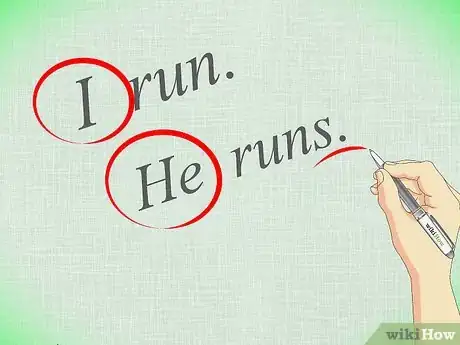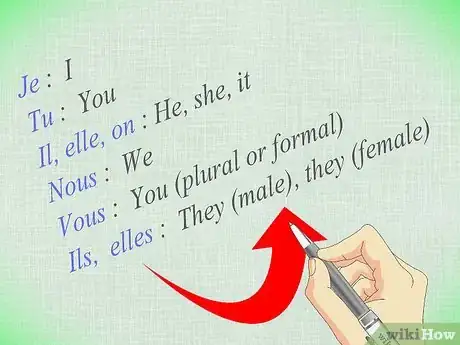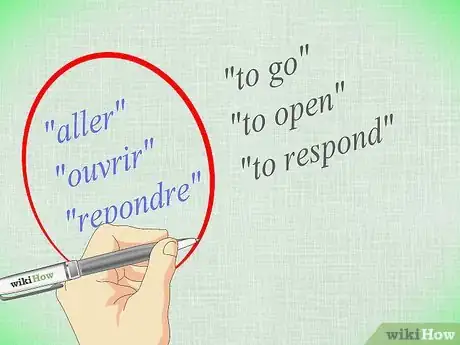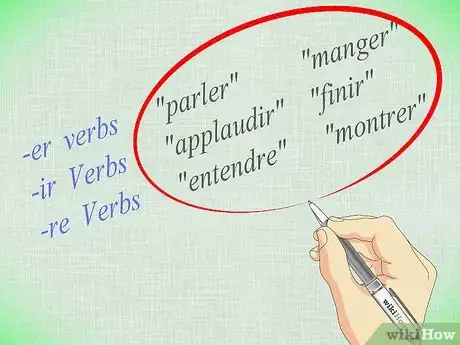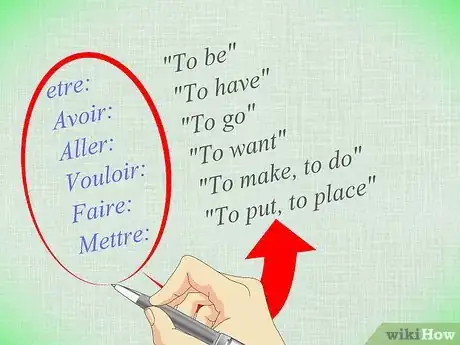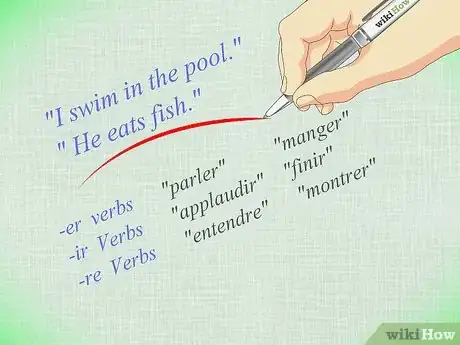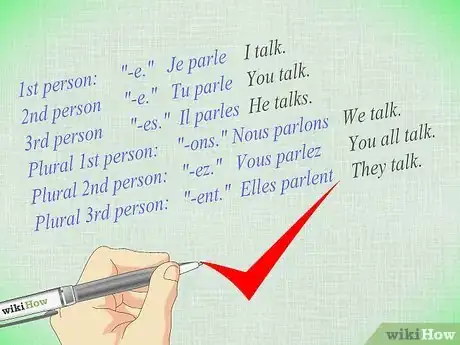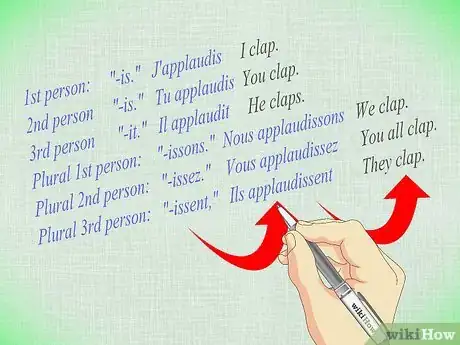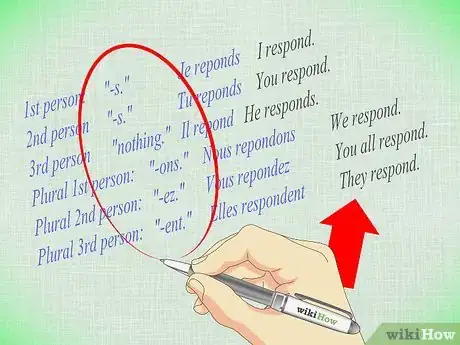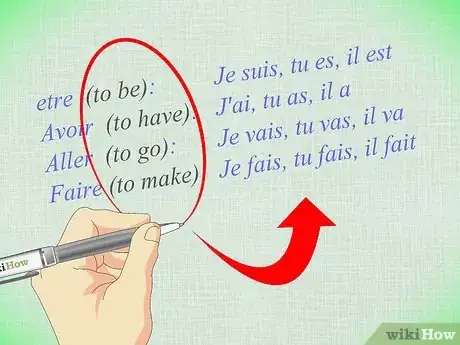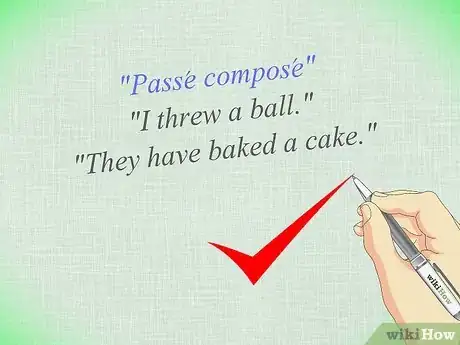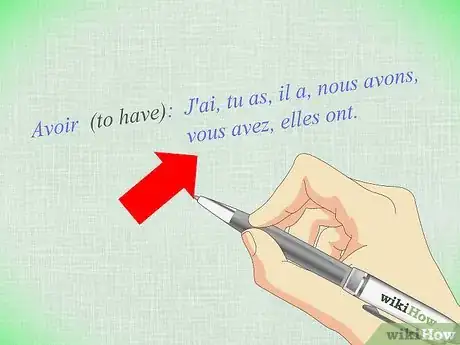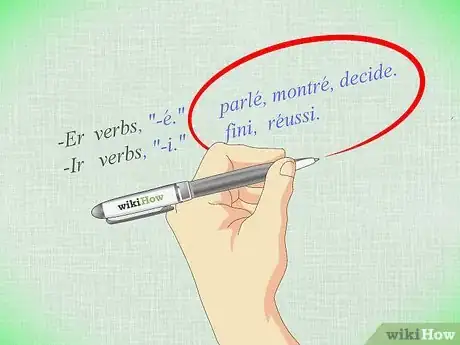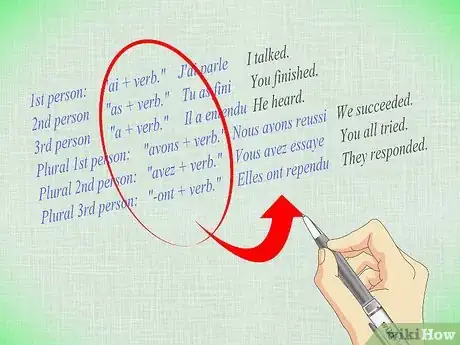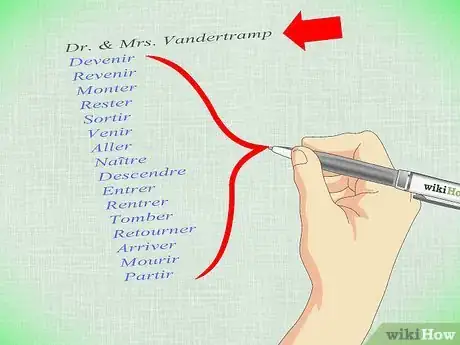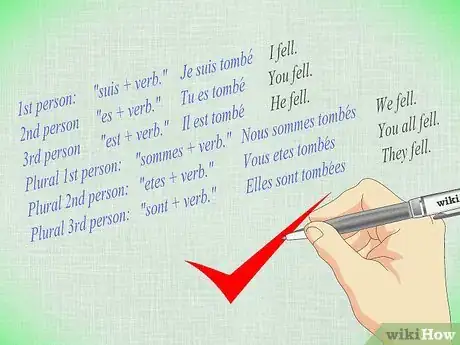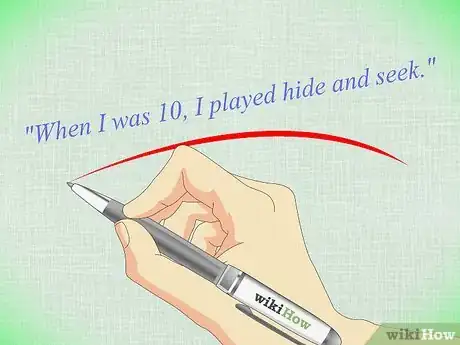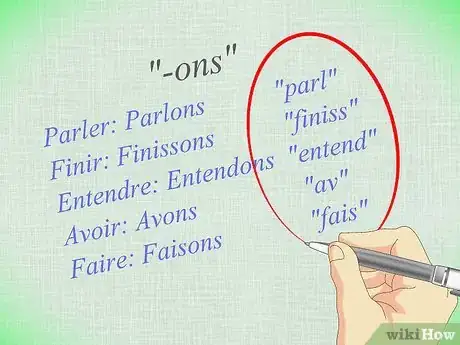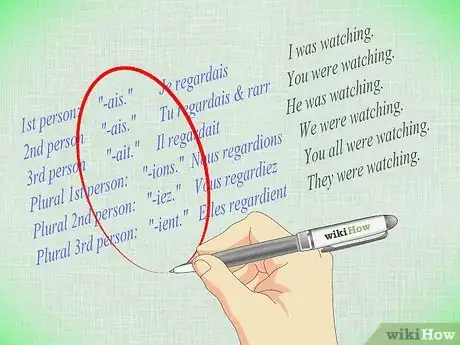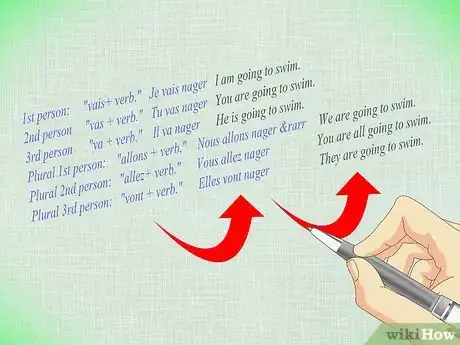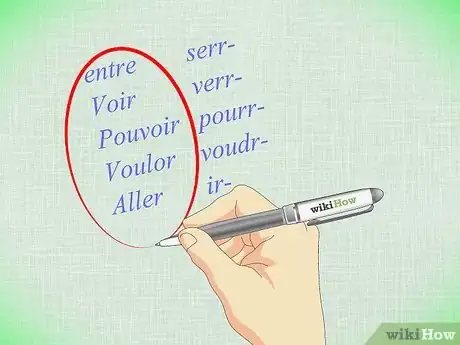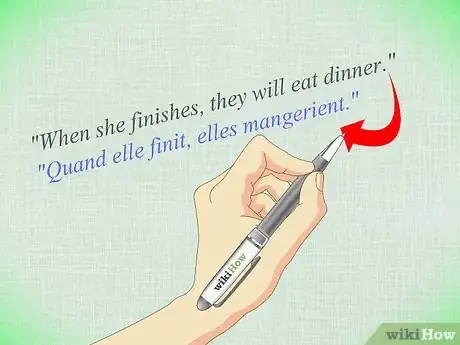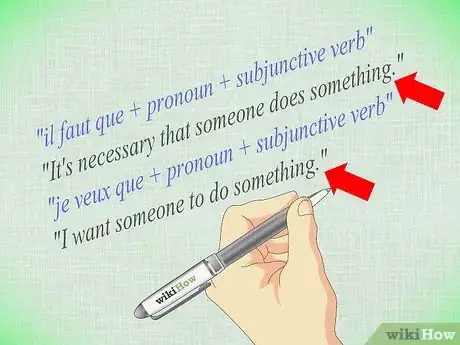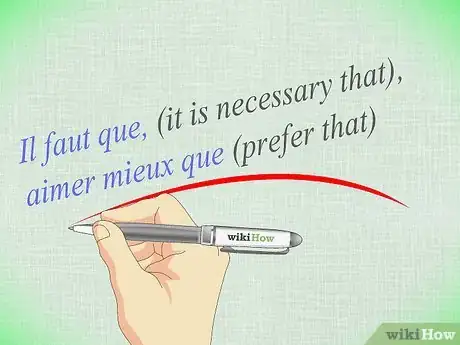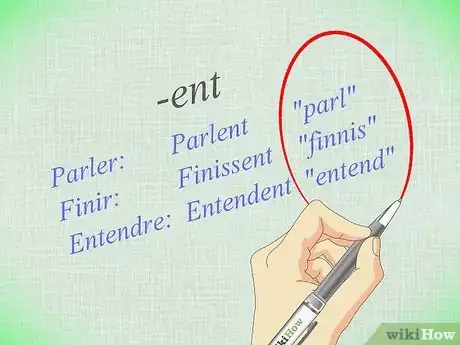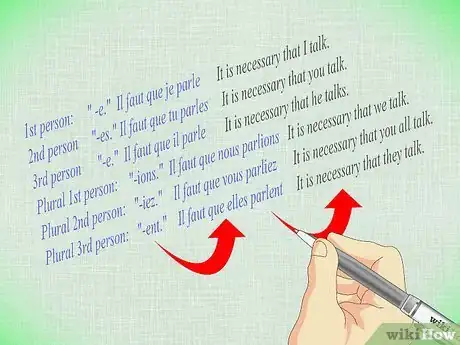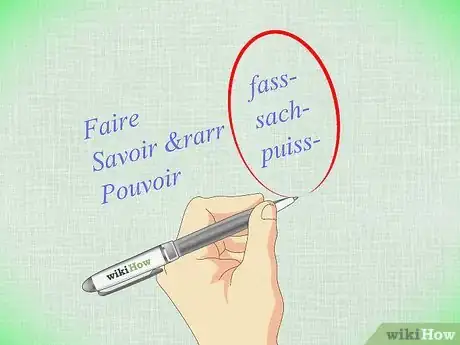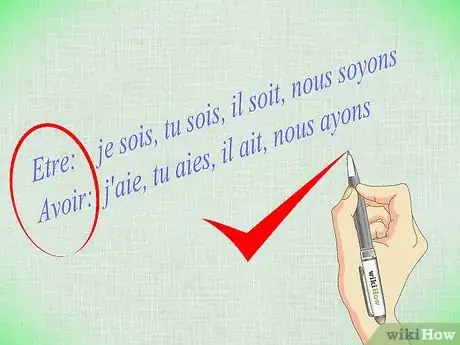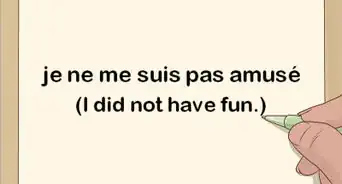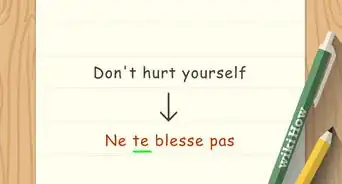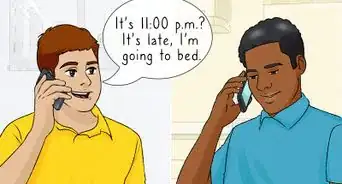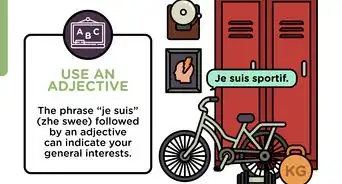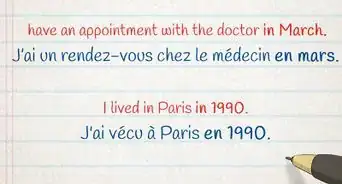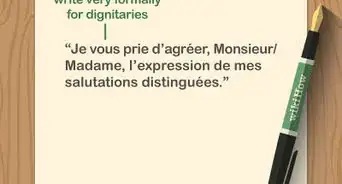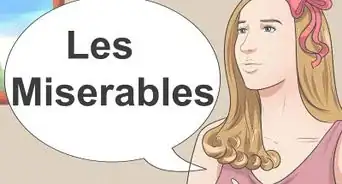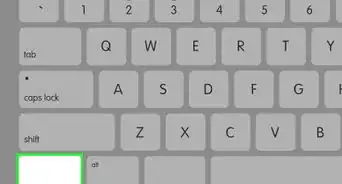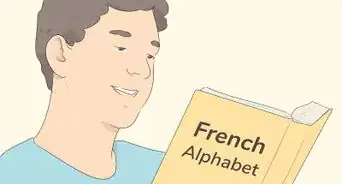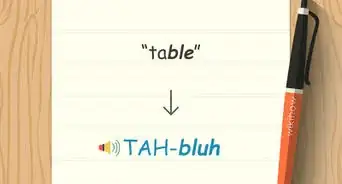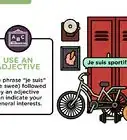This article was co-authored by Language Academia. Language Academia is a private, online language school founded by Kordilia Foxstone. Kordilia and her team specialize in teaching foreign languages and accent reduction. Language Academia offers courses in several languages, including English, Spanish, and Mandarin.
There are 12 references cited in this article, which can be found at the bottom of the page.
wikiHow marks an article as reader-approved once it receives enough positive feedback. In this case, several readers have written to tell us that this article was helpful to them, earning it our reader-approved status.
This article has been viewed 51,526 times.
Learning to conjugate verbs in French is often the biggest hurdle students face when learning the language. Luckily, the basics of conjugation are the same as in English: you change or modify the verb (to run, to talk, etc.) depending on the subject (I, she, you, we, etc.) and the tense (past, present, future) you are speaking in. While there are a total of 16 tenses in French, there are 5 that are commonly used and can cover most situations.
Steps
Understanding Conjugation
-
1Know that conjugation is when you change a verb based on who it involves. We do this in English as well. For example, you would say "I run," but you would add and "s" for "he runs." Conjugation in French works similarly; for every pronoun (I, he, she, it, we, you) there is a different conjugation.
-
2Remember the French pronouns. There are more French pronouns then English, but they are still easy to remember:
- Je: I
- Tu: You
- Il, elle, on: He, she, it
- Nous: We
- Vous: You (plural or formal)
- Ils, elles: They (male), they (female).
Advertisement -
3Note the infinitive of verbs. An unconjugated verb is called the "infinitive." In English you simply at the word "to," so the infinitive is "to be," "to see," or "to write." In French the infinitive is one word -- like "aller" (to go), "ouvrir" (to open) or "répondre" (to respond). The infinitive is the base verb, or what changes as you conjugate.[1]
- For example, in English you would not say, "He to be," you would say "he is." This is how we conjugate the verb "to be" in English.
-
4Recognize the three types of "regular" verbs. In French the large majority of verbs fall under three categories based on the ending of the infinitive. For each of these three categories there is a set of rules for conjugation.
- -er Verbs: This includes verbs like "parler" (to talk) and "manger" (to eat).
- -ir Verbs: This includes verbs like "applaudir" (to clap) and "finir" (to finish).
- -re Vebrs: This includes verbs like "entendre" (to hear).
-
5Know what verbs are irregular. There are, unfortunately, some verbs in French that no longer use the same rules to conjugate. Almost every tense of these verbs is different, so you often have to look irregular verbs up separately. While by no means exhaustive, this list shows some of the most common irregular verbs:
- être: To be
- Avoir: To have
- Aller: To go
- Vouloir: To want
- Faire: To make, to do
- Mettre: To put, to place.[2]
Present Tense Verbs
-
1Use the present tense for current or habitual action. The present tense is used similarly in French as in English. Use the present tense to translate phrases like "I swim in the pool" or "He eats fish." There are three basic types of verbs to conjugate, as well as a handful or "irregular verbs," or verbs that don't follow set rules. The basic types of verbs are:
- -er Verbs:"Parler" (to talk) and "manger" (to eat).
- -ir Verbs: "Applaudir" (to clap) and "finir" (to finish).
- -re Vebrs: "Entendre" (to hear).
-
2Conjugate "-er verbs" by replacing the "er." Each pronoun (I, you, he, she, it, we, they) has a different ending that goes in the place of "-er." The endings are -e, -e, -es, -ons, -ez, -ent. For example, "parler" (to talk), would conjugate as:
- First person: "-e." Je parle → I talk
- Second person: "-es." Tu parles → You talk
- Third person: "-e." Il parle, → He talks.
- Plural first person: "-ons." Nous parlons → We talk.
- Plural second person: "-ez." Vous parlez → You all talk.
- Plural third person: "-ent." Elles parlent → They talk.[3]
-
3Conjugate "-ir verbs by replacing the "ir". To do so, add in the following endings, depending on the pronoun: -is, -is, -it, -issons, -issez, -issent. For this example we will use "applaudir" (to clap):
- First person: "-is." J'applaudis → I clap.
- Second person: "-is." Tu applaudis → You clap.
- Third person: "-it." Il applaudit → He claps.
- Plural first person: "-issons." Nous applaudissons → We clap.
- Plural second person: "-issez." Vous applaudissez → You all clap.
- Plural third person: "-issent." Ils applaudissent → They clap.
-
4Conjugate "-re" verbs by replacing the "re." These are the least common regular verbs, but you still need to know how to conjugate them. The endings are -s, -s, nothing, -ons, -ez, ent. Note how one conjugation, the third person (he/she) does not have an ending. To conjugate an example, "répondre" (to respond):
- First person: "-s." Je réponds → I respond.
- Second person: "-s." Tu réponds → You respond.
- Third person: "nothing." Il répond → He responds.
- Plural first person: "-ons." Nous répondons → We respond.
- Plural second person: "-ez." Vous répondez → You all respond.
- Plural third person: "-ent." Elles répondent → They respond.
-
5Learn the conjugations for common irregular verbs. There are a lot of irregular verbs, but there are a few that are essential to know moving forward. The rest can be quickly looked up online by trying "Verb + French Conjugation."
- être (to be): Je suis, tu es, il est, nous sommes, vous êtes, elles sont.
- Avoir (to have): J'ai, tu as, il a, nous avons, vous avez, elles ont.
- Aller (to go): Je vais, tu vas, il va, nous allons, vous allez, elles vont.
- Faire (to make, to do): Je fais, tu fais, il fait, nous faison, vous faites, ils font.
- Advanced note: The conjugations of "être, "avoir," and "aller" are necessary for the past and future tenses. To make the future tense, for example, you conjugate "aller" (to go), then add the other verb so that it translates as "going to do (verb)."[4]
Passé Composé (Past Tense)
-
1Use the past tense for simple, complete actions in the past. The "passé composé" is for actions that had a definite beginning and end, such as "I threw a ball," or "They have baked a cake." Actions in the past that happen often or habitually (like the weather or your mood) use a different tense. The passé composé is the most common past tense in French. [5]
-
2Conjugate the present tense of "avoir" to start the passé composé. The passé compose is a compound tense, which is a fancy way of saying it has two parts. The first part is a conjugated version of "avoir" (to have)." This is similar to English, where you can say "I have eaten," or "She has run." This is the first part of your conjugation. As a refresher, the conjugation of "avoir" is:
- Avoir (to have): J'ai, tu as, il a, nous avons, vous avez, elles ont.
-
3Find the "past participle" of your verb. Think of the English expression, "I have eaten." Notice how "eaten" is not like any other conjugation for the verb "to eat." French does the same thing -- there is a different ending for the past tense of verbs. Luckily, they are easy to remember:
- -Er verbs, "-é." Examples: parlé, montré, decidé.
- -Ir verbs, "-i." Examples: fini, réussi.
- -Re verbs, "-u" Examples: entendu, répondu.
-
4Put the two parts together to form the past tense. Simply add your conjugation of "avoir" to your past participle to form the past tense. While the literal translation will always be "I have talked," or "they have listened," this tense can also translate to "I talked," or "they listened." Several examples from different verbs:
- First person: "ai + verb." J'ai parlé → I talked.
- Second person: "as + verb." Tu as fini → You finished.
- Third person: "a + verb." Il a entendu → He heard.
- Plural first person: "avons + verb." Nous avons réussi → We succeeded.
- Plural second person: "avez + verb." Vous avez essayé → You all tried.
- Plural third person: "-ont + verb." Elles ont répondu → They responded.
-
5Know the verbs that conjugate with "être" instead of "avoir." The formula "avoir + past participle works for 95% of French verbs. However, there are a selection of verbs that must use "être + past participle" (to be) to be put in the simple past tense. The translation is still in the past ("I fell"). These verbs are:
- Devenir, Revenir, Monter, Rester, Sortir, Venir, Aller, Naître, Descendre, Entrer, Rentrer, Tomber, Retourner, Arriver, Mourir, Partir
- A helpful way to remember these verbs is by the acronym, Dr. & Mrs. Vandertramp. You'll notice the list above is already in this order.
- Grammatically, these verbs are known as "intransitive verbs."[6]
-
6Replace "avoir" with "être" for Dr. & Mrs. Vandertramp verbs. Once you remember which verbs need "être" (to be), add the past participle to make the past tense. Note, however, that the verb has to match the subject. Plural phrases get an "-s" and expressions about females get an extra "-e"
- First person: "suis + verb." Je suis tombée → I fell. ("I" refers to a woman.)
- Second person: "es + verb." Tu es tombé → You fell.
- Third person: "est + verb." Il est tombé → He fell.
- Plural first person: "sommes + verb." Nous sommes tombés → We fell.
- Plural second person: "etes + verb." Vous êtes tombés → You all fell.
- Plural third person: "sont + verb." Elles sont tombées → They fell.
Imperfect Tense (Past)
-
1Know that the imperfect past refers to things that happened over a span of time. Though this seems tricky, it is actually simple in practice. The imperfect tense is used for things that happened in the past, but not at a specific time. For example, phrases like, "when I was 10, I played hide and seek," or "Every week, they ate Chinese food." These expression could refer to one of the many times you played hide and seek, or the broader habit of ordering Chinese food.
- Use Imperfect for: States of being, weather, habitual actions, emotions, age, background information.[7]
- The simple past is for the events of a story (I bought candy, I ate it), and the imperfect is for background information (I was ten, I went to the store after school each day, it was sunny).
-
2Find the "stem" of verbs by dropping the "-ons" from the present "nous" form. This works for irregular verbs as well. Start the imperfect by dropping the "-ons" from the nous form. The same same thing happens in English: the stem of "to walk," for example, is walk (walk, walks, walked, walking, etc.). Examples include:
- Parler: Parlons → "parl"
- Finir: Finissons → "finniss"
- Entendre: Entendons → "entend"
- Avoir: Avons → "av"
- Faire: Faisons → "fais"
- The only exception to this rule is "être, since the nous form ("nous sommes") does not have an "ons." The stem of être is "ét."
-
3Add the imperfect endings to your stem to get the imperfect tense. Unlike the passé composé, the imperfect tense is only one word. Simply add the endings to your stem and you've finished. The imperfect endings are "-ais, -ais, -ait, -ions, -iez, -aient." Using the verb "regarder" (to watch) as an example:
- First person: "-ais." Je regardais → I was watching.
- Second person: "-ais." Tu regardais &rarr: You were watching.
- Third person: "-ait." Il regardait → He was watching.
- Plural first person: "-ions." Nous regardions → We were watching.
- Plural second person: "-iez." Vous regardiez → You all were watching.
- Plural third person: "-aient." Elles regardaient → They were watching.
Future Tense
-
1Express the near future with "aller + infinitive of verb." This simple construction literally translates as "is going to do," and is used similarly in English. For example, use the near future for sentences like "I am going to run," "She will eat," or "they are going to study," basically any sentence where the action is going to take place soon. To use the near future tense, simply conjugate "aller" in the present tense and add your unconjugated verb. The example uses the verb "nager" (to swim).
- First person: "vais + verb." Je vais nager → I am going to swim.
- Second person: "vas + verb." Tu vas nager → You are going to swim.
- Third person: "va + verb." Il va nager → He is going to swim.
- Plural first person: "allons + verb." Nous allons nager &rarr: We are going to swim.
- Plural second person: "allez + verb." Vous allez nager → You all are going to swim.
- Plural third person: "vont + verb." Elles vont nager → They are going to swim.
-
2Add future endings to the infinitive form to make future tense. Remember that the infinitive is the normal version of the verb, like "parler," "finir," or "enterndre." The future stem always ends in an "r," so you must eliminate the "e" in verbs like "entrendre to continue. However, there is only one set of endings for every future tense verbs: "-ai, -as, -a, -ons, -ez, -ont." The following example uses "nager" (to swim):
- First person: "-ai." Je nagerai → I will swim.
- Second person: "-as." Tu nageras &rarr: You will swim.
- Third person: "-a." Il nagera → He will swim.
- Plural first person: "-ons." Nous nagerons → We will swim.
- Plural second person: "-ez." Vous nagerez → You all will swim.
- Plural third person: "-ont." Elles nageront → They will swim.
-
3Recognize the words with irregular future stems. There are, of course, exceptions to the rules. There are only a few, however, and a [complete list can be found here.] Some examples and their future stems include:
- être → serr-
- Voir → verr-
- Pouvoir → pourr-
- Voulor → voudr-
- Aller → ir-[8]
-
4Know that both clauses of a sentence need to be in the future tense, or neither. This is one instance where French and English differ. For example, English speakers would say, "When she finishes, they will eat dinner," with the first half in the present tense (she finishes) and the second in the future (they will eat). In French you would say, "Quand elle finira, elles mangeront."
Subjunctive Tense
-
1Use the subjunctive tense for uncertain or subjective actions and ideas. The subjunctive is used to express sentences like "I want you to do something," "It is necessary that we talk," or "she hopes that he ______." Unfortunately, there is no real subjunctive tense in English to compare with the French. The easiest way to comprehend the subjunctive is to read French and speak to French speakers, noting where they use it.[9]
- The most common phrases that use subjunctive are "il faut que + pronoun + subjunctive verb" ("It's necessary that someone does (verb)") and "je veux que + pronoun + subjunctive verb" ("I want someone to do (verb)")
-
2Know that all subjunctive phrases start with the "que." Before conjugating any subjunctive phrase, remember that the subjunctive tense always begins with "que," which translates as "that" or "who/whom."
- Examples: Il faut que, (it is necessary that), aimer mieux que (prefer that)
-
3Find the "stem" of verbs by dropping the "-ent" from the present "ils/elles" form. This works for irregular verbs as well. Start conjugating subjunctive by dropping the "-ent" from the plural 3rd person verb form. The same same thing happens in English: the stem of "to walk," for example, is walk (walk, walks, walked, walking, etc.). Examples include:
- Parler: Parlent → "parl"
- Finir: Finissent → finniss"
- Entendre: Entendent → "entend"'
-
4Add the subjunctive endings to complete the subjunctive tense. There is only one set of endings for the subjunctive tense in French. They are "-e, -es, -e, -ions, -iez, -ent." Remember to add the "que" as well. The following examples translate the phrase "it is necessary that (I, you, she, they, etc.) talks."
- First person: "-e." Il faut que je parle → It is necessary that I talk.
- Second person: "-es." Il faut que tu parles → It is necessary that you talk.
- Third person: "-e" Il faut que il parle → it is necessary that he talks.
- Plural first person: "-ions." Il faut que nous parlions → It is necessary that we talk.
- Plural second person: "-iez."Il faut que vous parliez → It is necessary that you all talk.
- Plural third person: "-ent."Il faut que elles parlent → It is necessary that they talk.
-
5Know what verbs are irregular in the subjunctive. Any verb that does not end in "-ent" in the present tense 3rd person plural ("They," or "Ils/Elles") has an irregular stem. Luckily, the endings are still the same. Some common verbs include:
- Faire → fass-"
- Savoir &rarr: sach-
- Pouvoir → puiss-
- Advanced Tip:' There are also several words that have two stems -- one singular and one plural. In this case, use the nous form, minus "-ons" and the same ending (Ex. buvoir &rarr: boiv & buv)[10]
-
6Memorize the the conjugations for "etre" and "avoir." These are the only two verbs that are completely different in the subjunctive. Unfortunately, they are also some of the most common words in French. To conjugate them:
- Etre: je sois, tu sois, il soit, nous soyons, vous soyez, elles soient.
- Avoir: j'aie, tu aies, il ait, nous ayons, vous ayez, elles aient.
Community Q&A
-
QuestionWhat is the tense of: If I were buying?
 Community AnswerThis is conditional. Any "if" sentence is either in conditional or conditionnel passé. Conditional: This is when you start with a verb conjugated in simple future add the endings from Imperfect to the end of the verb: Si J'avais faim, J'achéterai un gâteau (If I were hungry, I would by a cake). Past Conditional: Here you conjugate Avoir or être in the past and do the same thing: Si J'avais eu faim, j'aurais achété un gâteau (If I had been hungry, I would have bought a cake).
Community AnswerThis is conditional. Any "if" sentence is either in conditional or conditionnel passé. Conditional: This is when you start with a verb conjugated in simple future add the endings from Imperfect to the end of the verb: Si J'avais faim, J'achéterai un gâteau (If I were hungry, I would by a cake). Past Conditional: Here you conjugate Avoir or être in the past and do the same thing: Si J'avais eu faim, j'aurais achété un gâteau (If I had been hungry, I would have bought a cake).
Warnings
- When in doubt, always use the present tense. It is easy to use and the pronunciations are simple.⧼thumbs_response⧽
References
- ↑ http://www.languageguide.org/french/grammar/tense/
- ↑ http://www.french-linguistics.co.uk/grammar/irregular_verbs_common.shtml
- ↑ http://www.verbix.com/webverbix/go.php?D1=3&T1=aimer
- ↑ http://www.cestfacile.eu/en/verbs/conjugation.html
- ↑ https://www.laits.utexas.edu/tex/pr/tap8.html
- ↑ http://www.frenchtoday.com/blog/etre-versus-avoir-french-auxiliary-verbs-past-tenses
- ↑ http://www.french-linguistics.co.uk/grammar/imperfect.shtml
- ↑ http://www.french-linguistics.co.uk/grammar/future_tense_stems.shtml
- ↑ http://www.languageguide.org/french/grammar/subj
About This Article
To conjugate regular French verbs in the present tense, start by removing the ending of the infinitive form of the verb, such as “-er” or “-ir.” Then, replace it with the ending that corresponds with the subject of the sentence, like “-e” for a first person perspective or “-ent” for the third person plural. For irregular verbs, you'll need to learn the individual conjugations for each subject, such as "je suis" and "tu es." To learn how to conjugate French verbs in the past tense, keep reading.
